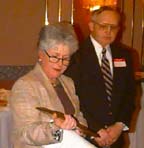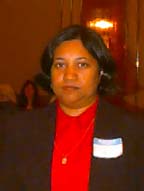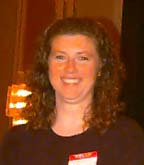
Today
Vol. 27, #2
April 2001
"We can eradicate sociological illiteracy if we take the time to rethink what we are doing."
Robert Wortham at the 2001 Annual Meeting

Today
Vol. 27, #2
April 2001
"We can eradicate sociological illiteracy if we take the time to rethink what we are doing."
Robert Wortham at the 2001 Annual Meeting
NCSA President-elect Robert Wortham shared his views on Eradicating Sociological Illiteracy with more than 180 other sociologists who attended the NCSA annual meeting in Durham on Feb. 16. "We can eradicate sociological illiteracy if we take the time to rethink what we are doing," Wortham said.
Sociologists must make structural changes in what they teach and how they teach. Wortham suggested that our best opportunity to reach students is in the introductory or principles course. Sociologists don't like to talk about marketing, he noted, but "we're about marketing."
Students need the tools to understand sociological concepts. Why wait until the end of their undergraduate careers for theory and methods courses? Students need a firm grounding in theory and methods in the principles course, he suggested.
Sociologists must convince students that they need what we offer--marketable skills and insight into social process. Faculty must consider as well how they are perceived by students. Do they see our love and passion for what we do? Wortham also addressed the issue of teachers of entertainers and encouraged the use of creativity to get students' attention.
Finally, eradicating sociological illiteracy must involve changing how the general public perceives the discipline. We must remind the public that we have something important to offer, Wortham concluded.
NCSA Welcomes Guests for the 2001 Meeting
NCSA President Ron Wimberley welcomed
a number of guests. These included Kenneth Spenner, Chair of the Sociology
Department at Duke; Kenneth Land, President of the Southern Sociological
Society; Johnny Underwood, Past-President of the NCCCSPA; and Nan Lin,
Immediate Past Vice-President of the ASA. "North Carolina is truly
the state of sociology," Wimberley proclaimed proudly.
|
|
Our Annual Awards Luncheon
At the annual Awards Luncheon, members
of the NCSA posthumously recognized the service of Pat Wyatt of Catawba,
who had served as secretary-treasurer for years before her untimely death
last spring.
Bolick.
Edith Bolick from Catawba College made
the following statement to the assembled members of NCSA at the Awards
Luncheon.
I have the privilege of joining you today to recognize the contributions of the late Dr. Pat Rector Wyatt to sociology in North Carolina. I first met Pat 25 years ago. I was fresh out of graduate school and had returned to teach at my alma mater, Catawba College in Salisbury. Pat was my first star student: industrious, bright, reflective. I once told her that before she graduated I would make out a test she couldn't ace, but I never did!The association also presented a Contributions to Sociology Award to Mike Wise of ASU. Catherine Harris of Wake Forest University introduced Mike Wise. Mike Wise did not know he was going to receive a Contributions to Sociology Award and was surprised.
When Pat completed her graduate studies at UNC, she entered the business world. From 1983 to 1991, she rose through the ranks at the Sara Lee Corporation in Winston-Salem, from Assistant Sales Planning Manager, to Director of Sales Planning and Research, to Director of User Services. I was happily surprised when Pat decided to leave Sara Lee to teach at Catawba.
She joined our faculty in 1991. As the newcomer, she had her share of introductory sociology courses. She accepted the challenge of teaching and made Introduction to Sociology and Social Problems two of the most popular courses in our general education curriculum. She was committed to the value of our discipline for students of all majors. Both in the corporate world and in the college setting, Pat did a great deal to combat sociological illiteracy
As a professor, Pat expected the best from her students, and she was the epitome of efficiency, fairness, and impartiality. When I once asked a student to characterize Dr. Wyatt's relationship with her students, he responded, "She treats us with respect."
Pat valued her students' insights as they explored the world of sociology and encouraged them to reflect on its relevance for their academic and personal growth. Pat served as Secretary-Treasurer of the North Carolina Sociological Association from 1992 until her untimely death last spring.
Pat had an enormous impact on the students she taught during her nine years at Catawba. In her quite and unassuming way, she represented our discipline well in the corporate world and in higher education. It is fitting that we honor her today with an award for her outstanding contributions to sociology.
Professor Bolick Presents Award to
Larry Wyatt, in Memory of His Wife Pat

Professor Mike Wise

Christine Dave

Shannon Davis
Davis describes her research as follows:
Much of the previous research
on transitions into parenthood examines factors which affect women becoming
mothers. Little work has examined factors which affect couples' becoming
parents.
Using data on married
couples collected in the National Survey of Families and Households,
I test competing theoretical frameworks, the neo-classical economic
approach and the doing gender approach, for their ability to predict the
timing of couples' first births. Further, I test whether a combined
model including factors from the economic approach and the doing gender
approach better describes the process through which married couples decide
to become parents.
The results suggest that
this combined theoretical approach is the better model for explaining the
couples' transitions into parenthood, with both economic factors and measures
of each spouse's beliefs about gender affecting the timing of their first
marital birth. The finding suggest that the family must be examined
as both an economic unit and as a location where men and women enact their
beliefs about gender.
After the luncheon more afternoon sessions addressed issues of concern to members of the NCSA.
When students in introductory sociology classes are asked what words come to mind to describe theory, they often respond, "Boring, abstract, and hard."
Steve McNamee told the audience that since students resist theory as a chore, he shifts from theory in itself to theory in us in contemporary society.
"Focus on the issues," he said, "and use theory to make sense of contemporary society."
Among the theoretical topics he suggested that could be used in a contemporary sense were Marx on the consequences of industrialization, Weber on bureaucracies, Durkheim on social integration, and Simmel on postmodernity (real versus not real).
M.E. Hughes emphasized that since scientific inquiry is grounded in observation, sociologists should emphasize methodology, sampling, and research design.
Hughes also suggested that students may find it useful to read good research data and methods in order to dissect them.
Hughes concluded that practical examples and hands-on problem solving do most to engage students in theory and research.
Chien Ju Huang also noted that students perceive theory as not applying to modern times and being about "dead white guys." She suggested that instructors use modern questions to connect to theory and to discuss how to apply it to our society. She uses GSS and telephone interviews in teaching research and recommends SPSS because it is more user friendly. She posts notes on-line for students to read before coming to class.
The annual meeting concluded with
a short business meeting. Secretary-treasurer Sue Pauley reported that
82 professionals and 100 students registered for the meeting.
Ron Wimberley announced the results of this year's election. Rick Dixon of UNC Wilmington will serve as president-elect and next year's program chair. New council members include Angela Jones of Elon, Teresa Scheid of UNC Charlotte, and Caroline Whitehead of Craven Community College. The proposed changes and additions to the NCSA constitution concerning replacement of nonperforming officers were passed by the membership.
Changes planned for SOCIATION TODAY, Membership Listings, Listserv, Website
Changes are planned for the way the NCSA publishes its bulletin, SOCIATION TODAY, as well as for how it collects and disseminates information to its members.
At its March 23 meeting, the NCSA Executive Council voted to move in the direction of an electronic journal and newsletter and to seek permission from all new and returning members to list specific contact information about them on its web site.
"This year will be a transition year," explained Lee Dodson, editor of SOCIATION TODAY. "Members will continue to receive a printed version of our bulletin three times a year. Beginning in the year 2002, we will publish an electronic edition of SOCIATION TODAY twice a year on the NCSA website while sending out only one paper edition. The paper edition will contain materials needed to register for the annual meeting, candidate information and ballots for officers." These changes will reduce the cost of printing, mailing and preparation while contributing in some small way to the reduction in the amount of paper crossing members' desks.
Electronic postings may also speed up the movement of announcements and news by reducing the time between an event and its coverage on the web site.
In part because of these changes, the NCSA will rely on its Listserv to contact members with news and announcements. Members will be asked to add their names and contact information for inclusion on the NCSA web site membership listing as well. As membership applications and renewals are returned to the secretary-treasurer, the relevant information will be shared with the Listserv administrator.
Contact information, for those members who give their permission for its use, will be posted on the web site.
These changes will begin to take effect with registration for the 2002 meeting and collection of membership dues and applications for the same year. NCSA members will be asked to give their permission to list the following contact information: name, institutional affiliation, e-mail address, and phone. Members may chose which information, if any, they want posted on the NCSA web site. Members who provide e-mail addresses will be added to the NCSA Listserv. Members of the NCSA Executive Council tentatively plan to continue publishing the paper directory of members' names, addresses and contact information, at least for another year. The membership directory has been published every other year for the last six years.
A new edition is due out for the 2002 meeting. If you have comments or questions about these proposed changes, please contact any member of the NCSA Executive Council (names and contact information on the web, or use the Listserv to share your concerns with those members who subscribe to this service.
Graduate Programs Emphasize Finding Compatible Areas of Interest
Representatives from NC State University, UNC Greensboro, Fayetteville State University, Duke, UNC Charlotte, Appalachian State University, and North Carolina Central University were present at the North Carolina Sociological Association's 2001 meeting to give information about their respective graduate school programs and to field any questions attendees may have.
Panelists told what degrees and specializations are offered at their institution and what makes their program unique. However, in the midst of all the institution specific information, a general consensus formed among the speakers.
Every single representative emphasized that students need to make sure they are applying to a school that is compatible with their area of interest. In other words, do not bother applying to a school that does not have a strong demography curriculum when that is where your main interest lies. You cannot expect to be happy or successful in a program where your interests and theirs do not match.
Do some research to find out which schools cater to your interest. Become knowledgeable about a school's specialties, degrees offered, entrance standards, faculty dynamic and size of program before applying. Once you decide what programs meet your standards it is time to apply and let them know you meet theirs. Each school has its own idiosyncrasies surrounding the application process but for the most part they all look at the same traits in their applicants.
Quantitative standards are evaluated by GRE scores and GPAs. Recommendation letters are also looked at as part of the application. The panelists made sure to point out to get recommendations from professors who really know you well. Do not just ask someone who had you in class once. Also make sure you give them ample time to write the letter for you. Writing samples proved to be weighted heavily in every graduate school program present. They want to see how well you can communicate and how well you mesh with their program. Finally the panel emphasized applying early, especially if you want to be considered for any form of financial aid. Other words of advice from the panel were to take your theory, methods and statistics courses very seriously. These courses are closely look at during the application process.
Panelists also recommended utilizing their school web site. There you can find all the details about their program along with faculty contact information. Use the contact information to start a dialogue with a faculty member from programs you are interested in. Seek further information and assistance and to distinguish yourself from other applicants.
Here Are Some Tips about Pursuing a Career in Sociology
by Cathy Coker,
Elon College
Students and job seekers received some practical advice from career counselors, professors, and state government employee about pursuing careers in sociology at the NCSA's annual meeting in Durham. The theme of the session could be described as "thinking outside the box."
The career opportunities for sociology majors are endless. You do not have to remain in the traditionally prescribed teaching and social work professions. However, no matter what career path you choose you need to know how to market yourself.
To "think outside the box" when you are searching for a job, you must not limit yourself to looking for jobs that specifically ask for sociology degrees. Instead look for jobs for which you have the skills.
Panelists strongly emphasized the word skills over and over in their presentation because employers are no longer looking for just certain types of majors. They want employees with skills.
This is extremely beneficial for sociology majors because they can offer an array of skills. Sociologists have extensive backgrounds in research, communication (written and oral), and they "know" people. These characteristics are valuable in any field, which is why sociologists have begun to be employed marketing, government careers, film, etc.
Employers want to see how you have fine-tuned and used your skills during you collegiate career. Careful preparation of a strong resume will help present a favorable view of your skills. Employers want to see a balanced student--someone who not only excelled scholastically but who also demonstrated active involvement in organizations at school or in the community. Employers want to see a happy medium of the academic achievement (GPA) and social and community involvement.
The panel also had suggestions on interviewing for jobs. They suggested making a one minute "infomercial" about yourself.
Always be prepared to tell why you are a sociology major, what you can bring to their institution, basically what skills you have and how you have used them. This can be used in formal interviews or just casual networking.
The general population is still automatically classifying sociologist as social workers, which is not a bad thing if that is what field you want to pursue. However, if that is not the case, you have to educate others that you are capable of doing just about anything and that they can only benefit from having a sociologist in their corner.
The panelist warned students about saying "I want to help people," or "I like to work with people." While this may be true, employers hear this all too often and it becomes meaningless. Instead, once again, emphasize to your skills. The job search may be discouraging at times. The panel also addressed this issue.
They advised students to have a plan B or C, a fall-back plan in case the first one doesn't work. Sociologists have the qualifications that are very job transferable. Also one of the best ways to get employed is to be employed. In other words do not stay out of the work force while you are searching for a job. Go to a temporary agency and get a job or do volunteer work.
It does not matter what the job is; this is just get to something to show employers that you are qualified. Panelists emphasized talking to your career services center on your campus. They have more information and assistance than you think and can help you get your foot in the door (or even more than one door).
Attention Graduating Seniors, Major Advisors, and Professors!
Please remember that outstanding papers by undergraduate and graduate students may be considered for the Himes Award next year. You may submit any papers written this spring to be considered for the 2002 awards. For more information, please contact Steve McNamee at 910-962-3421.
|
|
See back issues of Sociation Today